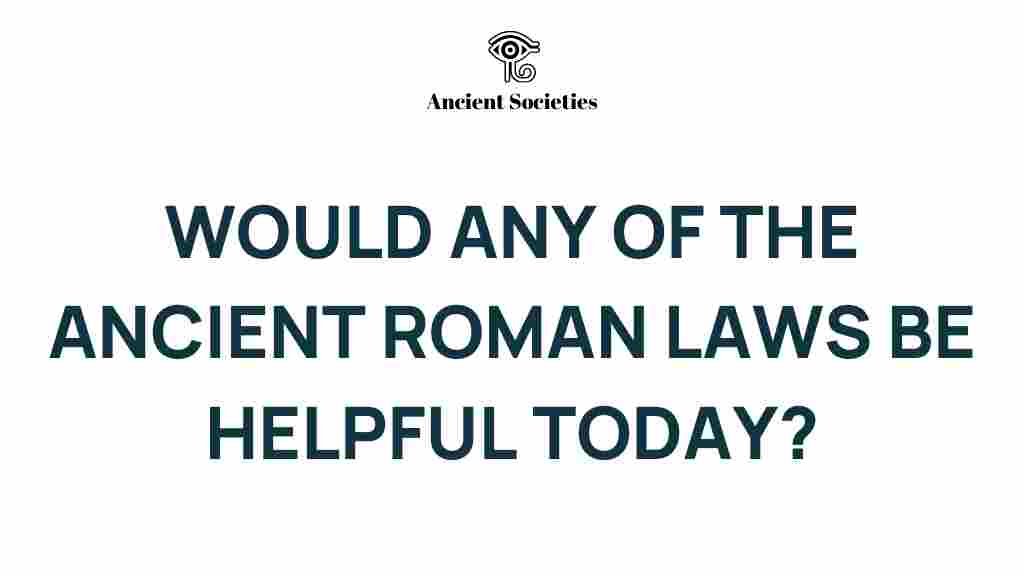Ancient Roman Laws: Could They Offer Solutions for Modern Society?
The ancient Roman laws are not just historical artifacts; they hold significant relevance that can inspire solutions for modern society. As we grapple with issues of governance, justice, and civic duty, examining the principles of these legal systems may provide valuable insights. This article explores the essence of ancient Roman laws, their historical relevance, and how they can inform modern legal reforms.
Understanding Ancient Roman Laws
Ancient Roman laws were foundational to the development of legal systems in many Western nations. The Codex Justinianus, the Twelve Tables, and the principles of Roman law have influenced modern legal frameworks significantly. Here’s a brief overview of key aspects:
- The Twelve Tables: The earliest attempt to create a code of law in Rome, established around 450 BC, which provided a foundation for citizens’ rights.
- Civil Law vs. Common Law: Roman law laid the groundwork for civil law systems, focusing on written codes, as opposed to common law’s reliance on case precedents.
- Legal Principles: Concepts such as ‘innocent until proven guilty’ and the right to a fair trial trace back to Roman legal traditions.
The Historical Relevance of Ancient Roman Laws
To appreciate the potential of ancient Roman laws in modern governance, it’s essential to understand their historical context:
- Adaptability: Roman law evolved over centuries, showcasing adaptability to changing societal needs.
- Citizen Participation: Roman citizens had a role in governance, emphasizing the importance of civic duty and political engagement.
- Legal Education: The establishment of legal schools in Rome underlines the value placed on legal education and the professionalization of the legal system.
Modern Society: Challenges in Governance and Justice
In today’s world, we face numerous challenges in governance and justice:
- Corruption: Many modern legal systems are plagued by corruption, undermining trust in governance.
- Access to Justice: Disparities in access to legal representation continue to exist, affecting marginalized communities.
- Political Polarization: A divided political landscape often hampers effective governance.
Could Ancient Roman Laws Provide Solutions?
Reflecting on ancient Roman laws can unveil strategies to address these modern challenges. Here’s how:
1. Reinforcing Civic Duty
In ancient Rome, civic duty was paramount. Citizens were expected to engage in governance actively. Modern society could benefit from:
- Encouraging civic education in schools to foster an informed citizenry.
- Implementing community service requirements that promote civic responsibility.
2. Legal Reforms for Transparency
Roman laws stressed the importance of transparency and accountability. Modern legal systems can adopt reforms such as:
- Establishing independent watchdog organizations to monitor legal processes.
- Enhancing public access to legal documents and court proceedings.
3. Emphasizing Written Law
Like the Twelve Tables, a clear and accessible legal code can provide structure and predictability. Modern implications include:
- Creating simplified legal codes that are easy for the general public to understand.
- Utilizing technology to disseminate legal information widely.
4. Legal Education and Professionalization
Modernizing legal education to reflect the complexity of today’s society can improve the justice system. Steps include:
- Integrating ethics and civic responsibility into legal curricula.
- Offering pro bono training to law students to encourage community engagement.
Troubleshooting Common Misconceptions
When considering the application of ancient Roman laws to modern society, several misconceptions may arise:
- Outdated Relevance: Some believe that ancient laws are irrelevant today. However, many foundational concepts remain applicable.
- Over-Simplification: The complexity of modern legal issues may lead to oversimplified solutions. It’s important to adapt rather than replicate.
- Resistance to Change: Legal reforms often face opposition. Engaging stakeholders in discussions can mitigate resistance.
Implementation of Ideas from Ancient Roman Laws
To effectively integrate principles of ancient Roman laws into contemporary legal systems, a step-by-step approach is essential:
- Research and Analysis: Conduct thorough research on ancient Roman laws and their applications in various contexts.
- Engage Stakeholders: Involve community leaders, legal experts, and the public in discussions on potential reforms.
- Pilot Programs: Test new initiatives in local jurisdictions to evaluate effectiveness before a wider roll-out.
- Continuous Feedback: Establish mechanisms for ongoing feedback and adaptation of legal reforms.
Conclusion
Ancient Roman laws offer a treasure trove of insights that can inform modern governance and justice systems. By exploring the historical relevance of these legal principles, we can identify solutions to contemporary challenges such as corruption, access to justice, and political division. Emphasizing civic duty, enhancing transparency, and modernizing legal education are just a few ways we can learn from the past to create a better future.
Incorporating these ancient principles into our legal systems not only honors our history but also strengthens our commitment to justice and governance. As we consider legal reforms, let us draw inspiration from the wisdom of ancient Rome, ensuring that the tenets of justice and civic duty remain at the forefront of our society.
For further reading on the impact of ancient laws on modern legal systems, you may explore this resource.
To delve deeper into the integration of civic duty in governance, check out this article.
This article is in the category History and created by AncientSocieties Team
